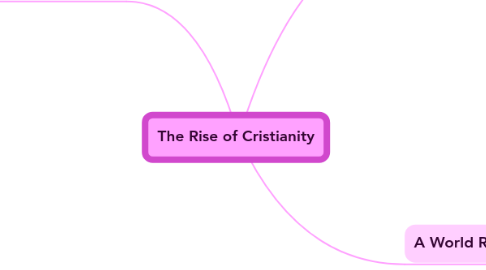
1. Christianity Spreads Through the Empire
1.1. Jesus' teachings did not contradict Jewish law, and his first followers were Jews.
1.2. Paul's Mission
1.2.1. Paul was a jew who had never met Jesus and at first was an enemy of Christianity.
1.3. Jewish Rebellion
1.3.1. In 66 A.D, a band of Jews rebelled against rome.
1.4. Persecution of the Christians
1.4.1. This refusal was seen as a opposition to roman rule.
1.4.2. By teh second century, as the Pax Romana began to crumble, persecution of the christians intensified.
2. The life and teachings of Jesus
2.1. Roman poweer spread to judea,the home of the Jews, around 63 B.C.
2.1.1. New node
2.2. Rome then took control of the Jewish kingdom remained independent.
2.3. Some historians believe that sometime around 6 to 4 B.C. a Jew named Jesus was born
2.4. At the age of 30, Jesus began his public ministry.
2.5. The main source of information about his teachings are in the first four books of the New Testament.
2.6. After Jesus' death, his body was placed in a tomb .
3. A World Religion
3.1. Christianity grew because it embraced all people men and women, enslaved persons, the poor, and nobles.
3.2. Constantine Accepts Christianity
3.2.1. Constantine was fighting three rivals for leadership of Rome.
3.2.2. In the next year, A.D. 313, Constantine annouced an end to the persecution of Christians.
3.3. Early Christian Church
3.3.1. A Bishop was also a priest, supervised several local churches.
3.3.2. The apostle peter had traveled to Rome from Jerusalism and became the first bishop there.
3.4. A Single voice
3.4.1. Disagreements about beliefs develped among its followers.
3.4.2. In A.D. 325, Constantine moved to solodify further the teachings of Christianity.
3.5. The Fathers of the Church
3.5.1. Augustine taught that humans needed the grace of God to be saved.
3.5.2. Augustine wrote that the fate of cities such as Rome was not important because the heavenly city, the city of God, could never be destroyed.
